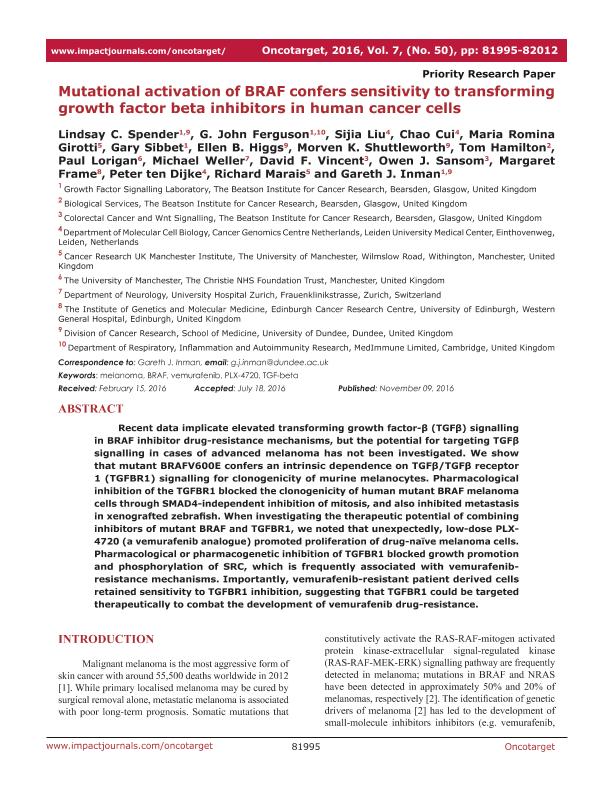Artículo
Mutational activation of BRAF confers sensitivity to transforming growth factor beta inhibitors in human cancer cells
Spender, Lindsay C.; Ferguson, John; Liu, Sijia; Cui, Chao; Girotti, Maria Romina ; Sibbet, Gary; Higgs, Ellen; Shuttleworth, Morven K.; Hamilton, Tom; Lorigan, Paul; Weller, Michael; Vincent, David F.; Sansom, Owen J.; Frame, Margaret; Dijke, Peter ten; Marais, Richard; Inman, Gareth J.
; Sibbet, Gary; Higgs, Ellen; Shuttleworth, Morven K.; Hamilton, Tom; Lorigan, Paul; Weller, Michael; Vincent, David F.; Sansom, Owen J.; Frame, Margaret; Dijke, Peter ten; Marais, Richard; Inman, Gareth J.
 ; Sibbet, Gary; Higgs, Ellen; Shuttleworth, Morven K.; Hamilton, Tom; Lorigan, Paul; Weller, Michael; Vincent, David F.; Sansom, Owen J.; Frame, Margaret; Dijke, Peter ten; Marais, Richard; Inman, Gareth J.
; Sibbet, Gary; Higgs, Ellen; Shuttleworth, Morven K.; Hamilton, Tom; Lorigan, Paul; Weller, Michael; Vincent, David F.; Sansom, Owen J.; Frame, Margaret; Dijke, Peter ten; Marais, Richard; Inman, Gareth J.
Fecha de publicación:
09/11/2016
Editorial:
Impact journals
Revista:
Oncotarget
ISSN:
1949-2553
e-ISSN:
1949-2553
Idioma:
Inglés
Tipo de recurso:
Artículo publicado
Clasificación temática:
Resumen
Recent data implicate elevated transforming growth factor-β (TGFβ) signalling in BRAF inhibitor drug-resistance mechanisms, but the potential for targeting TGFβ signalling in cases of advanced melanoma has not been investigated. We show that mutant BRAFV600E confers an intrinsic dependence on TGFβ/TGFβ receptor 1 (TGFBR1) signalling for clonogenicity of murine melanocytes. Pharmacological inhibition of the TGFBR1 blocked the clonogenicity of human mutant BRAF melanoma cells through SMAD4-independent inhibition of mitosis, and also inhibited metastasis in xenografted zebrafish. When investigating the therapeutic potential of combining inhibitors of mutant BRAF and TGFBR1, we noted that unexpectedly, low-dose PLX-4720 (a vemurafenib analogue) promoted proliferation of drug-naïve melanoma cells. Pharmacological or pharmacogenetic inhibition of TGFBR1 blocked growth promotion and phosphorylation of SRC, which is frequently associated with vemurafenib-resistance mechanisms. Importantly, vemurafenib-resistant patient derived cells retained sensitivity to TGFBR1 inhibition, suggesting that TGFBR1 could be targeted therapeutically to combat the development of vemurafenib drug-resistance.
Palabras clave:
Melanoma
,
Resistance
,
Tgfb
,
Braf
,
Vemurafenib
,
Plx 4720
,
Tgf Beta
Archivos asociados
Licencia
Identificadores
Colecciones
Articulos(IBYME)
Articulos de INST.DE BIOLOGIA Y MEDICINA EXPERIMENTAL (I)
Articulos de INST.DE BIOLOGIA Y MEDICINA EXPERIMENTAL (I)
Citación
Spender, Lindsay C.; Ferguson, John; Liu, Sijia; Cui, Chao; Girotti, Maria Romina; et al.; Mutational activation of BRAF confers sensitivity to transforming growth factor beta inhibitors in human cancer cells; Impact journals; Oncotarget; 7; 50; 9-11-2016; 81995-82012
Compartir
Altmétricas



